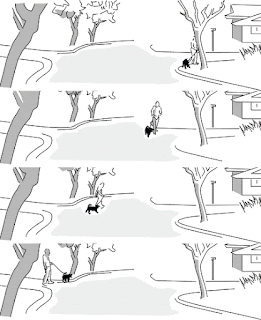In my last blog (jeez, has it been 20 days already?), I promised to share another theory regarding the past, present, and future: eternalism. Eternalism, according to Microsoft's AI (called Copilot), is "a philosophical theory of time that holds that all points in time are equally real, as opposed to presentism, which says that only the present is real, or the growing block theory, which says that the past and present are real, but the future is not (TBEIASB*).
I think I should avoid getting into the weeds about what eternalism is and is not. That would involve things like the general and special theories of relativity and ontology (the philosophical study of being), all of which are above my pay grade. That way lies the looney bin (why, one wonders, don't they call it the luny bin and give the moon the credit it is due for craziness?). The
Internet Encyclopedia of Philosophy tells us that there are three types of time: physical, psychological, and biological. The physical time is measured by clocks. The biological kind manifests in "regular, periodic biological processes" such as your heartbeat, breathing, and the cycle of sleeping and waking. Psychological, or subjective, reflects our experience of how time passes, e.g., slow when bored and fast when "intensively involved."
According to the encyclopedia, philosophers are not so much interested in what time is but why it is, specifically "why is there time instead of no time?" It then goes on, unhelpfully, to say there is no agreed-on answer to this question. Theology has its perspective: "[insert god of your choice here] willed it so." Then there is the smart-ass response: "If time were not to exist, we would not be asking why it does."
Maybe the wise thing to do here is not to ask questions and just, as many self-help authors advise, live in the moment. Asking questions about time doesn't accomplish much other than create more things to stress us out. Scientists, for example, who wondered what our future holds came up with cheery ideas like the Big Crunch (space stops expanding and starts contracting until we can all fit on the head of a pin), the Big Chill (the Universe runs out of energy), the Big Rip (dark energy run amuck and tears everything, down to the last quantum bit, to shreds), the Big Snap (the fabric of space stretches too far and breaks like a rubber band), the Mirror Universe (time flips and starts to run in reverse), and the Death Bubble. That last one, if you must know, involves "a bubble with no inside that expands at nearly the speed of light destroying everything in its path." It could happen a gazillion years from now or tomorrow at around 10:33 a.m. See? Didn't I tell you?
Another choice would be to adopt personalized theories of time that account for its existence in a manner that conveys how brilliant we are, how good we look, and what we care about most. I, for example, would put forth the theory of waffleism. In short, time exists so that waffles can cook properly. Waffles are important, Copilot tells us, "because they are a part of many cultures and traditions, and they bring joy and satisfaction to many people." So, if time did not exist, waffles would never make the phase transition from the sloppy. slightly gross batter state into "the honey-combed treats we know today." From observation, we see that waffles do make that transition, therefore, time exists and has purpose. No further explanation needed.
*To be explored in a subsequent blog.
(Image by Benjamin Crowell - Own work, CC BY-SA 4.0, https://commons.wikimedia.org/w/index.php?curid=99171959. In Crowell's words, "An illustration of the block universe concept, showing a man walking his dog. Time progresses through a series of snapshots from the bottom of the page to the top. In a naive sense view of time, each of those four instants would exist one after another. According to eternalism, those four instants (past, present and future) all equally exist. The dog's name is Lucy."


Comments
Post a Comment